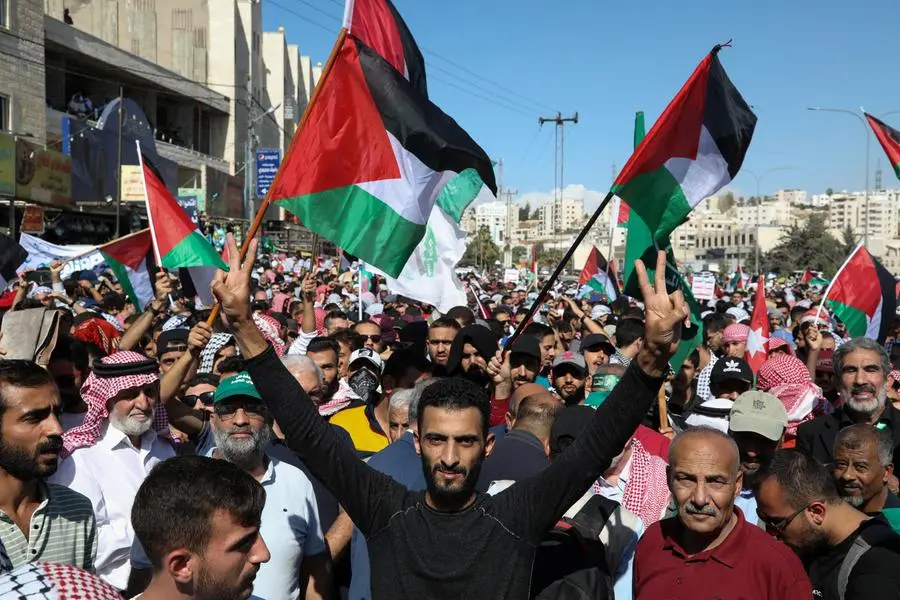PHOTO
AMMAN/CAIRO - Protesters from Jakarta to Tunis on Friday demanded an end to Israel's bombardment of Gaza after nearly two weeks of intense air and artillery strikes that authorities there say have killed 4,100 people.
Israel is gearing up for a ground war in the tiny, crowded Palestinian enclave aimed at eradicating Hamas, the militant Islamist group that rampaged into Israeli towns on Oct. 7, killing 1,400 people and seizing hostages.
While some Western governments have voiced support for Israel's military campaign, many Muslim states have called for an immediate ceasefire, with many of their people angry at conditions in Gaza and expressing solidarity with Palestinians.
Protests suddenly erupted across much of the region late on Tuesday after Gaza authorities said hundreds of people had been killed in a blast at a hospital. Hamas said an Israeli airstrike was responsible. Israel blamed a failed rocket launch by a Palestinian group.
In Jordan, which made peace with Israel in 1994, but where much of the population has Palestinian heritage, more than 6,000 protesters marched in the centre of the capital while thousands more rallied near the Israeli embassy.
Protesters voiced support for Hamas, urging it to attack Israel with rocket strikes and suicide bombings, and addressing the Palestinian group with the chant: "We are your army."
Thousands of demonstrators also gathered in each of Turkey and Egypt, two other countries that have long had full diplomatic relations with Israel, demanding an end to the bombing.
About 2,000 people gathered in front of Istanbul's Beyazit Mosque, burning an effigy of Israeli Prime Minister Benjamin Netanyahu and waved Palestinian flags. Some held placards reading: "Stop the genocide" and "Terrorist Israel".
In Egypt, thousands of protesters stood at the al-Azhar mosque, one of the oldest in the world, chanting "Where is the Arab army?", while others gathered at the central Tahrir Square.
Some demanded military action against Israel, others said Arab states should consider using other methods to stop the bombardment of Gaza. Egypt borders Gaza but has not been able to negotiate an opening of its crossing to allow in aid.
"Palestine is the only country that unites our voices. If the Gulf countries do not send aid, at least they should stop sending oil and gas. That's the least they should do," said protester Mohammed Gomaa in Cairo.
BURNING FLAGS AND EFFIGIES
In Morocco, where the government agreed in 2020 to normalise ties with Israel in return for U.S. recognition of Moroccan sovereignty over the disputed territory of Western Sahara, Islamists and leftists said they would hold a sit-in later on Friday.
Hundreds of people marched in central Tunis, a smaller protest than ones that have rallied there against Israel's Gaza campaign in recent days. Others demonstrated in front of the U.S. embassy.
"The real terrorism is Israel and America, which supports it," said Souhail Ben Nasser, a protester in the Tunis crowd.
In southeast Asia hundreds of people gathered to protest near the U.S. embassies in each of the Indonesian and Malaysian capitals, burning Israeli flags and stamping on pictures of Netanyahu and U.S. President Joe Biden.
"Today we gather here with the same intention to condemn the criminal act by Israel," said Qilla Marisa, a protester in Kuala Lumpur.
Muslims in India staged smaller protests in Jaipur and Mumbai, holding up placards reading "Free Palestine".
Israel's biggest regional foe Iran, and allied groups around the region, also held state-sanctioned protests. In Iraq, Shi'ite militias backed by Tehran mobilised hundreds of supporters in Baghdad near the bridge leading to the fortified Green Zone where the U.S. embassy is located.
On Iraq's border with Jordan, hundreds of supporters of Iran-backed paramilitary groups staged a sit-in to voice support for Gaza, brought in by bus. "We are going to support our people in Palestine," said one of them, 26-year-old Hussein Samir.
(Reporting by Suleiman al-Khalidi in Amman, Nafisa Eltahir in Cairo, Amina Ismail in Baghdad, Tarek Amara in Tunis, Ali Kucukgocmen and Bulent Usta in Istanbul, and Ahmed Eljechtimi in Rabat; Writing by Angus McDowall; Editing by Daniel Wallis)





















